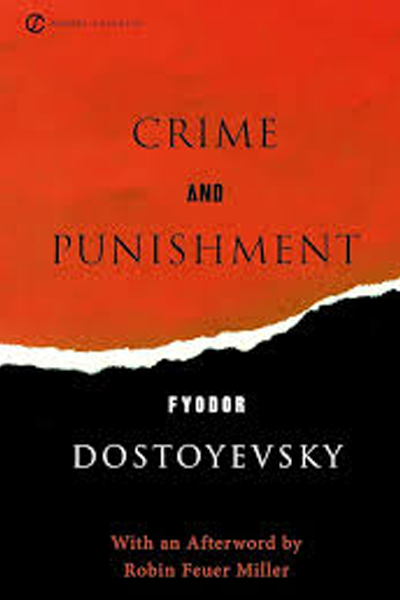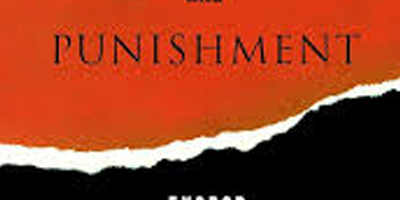
Fyodor Dostoevsky’s “Crime and Punishment” is a literary masterpiece that delves deep into the psyche of its protagonist, Raskolnikov, and explores the moral and psychological consequences of crime. This profound narrative, however, extends beyond its 19th-century Russian setting, offering timeless insights into the complexities of crime, punishment, and redemption. This review examines “Crime and Punishment” through the lens of modern criminal justice, particularly focusing on the treatment of ex-offenders and their reintegration into society.
Synopsis and Themes
“Crime and Punishment” follows Rodion Raskolnikov, a former student living in poverty, who believes he is destined for greatness. Driven by a belief in his own extraordinary status, he commits a brutal murder, rationalizing it as a means to a greater good. The novel meticulously traces Raskolnikov’s psychological turmoil and guilt, ultimately leading him to confession and a journey toward redemption.
The central themes of the novel—guilt, redemption, and the morality of crime—are not only pivotal to Raskolnikov’s story but also resonate deeply with contemporary discussions on the criminal justice system’s handling of ex-offenders. Dostoevsky’s exploration of the human condition raises critical questions about the effectiveness of punitive measures versus rehabilitative approaches.
The Punitive Approach: Reflections from the Novel
Dostoevsky vividly portrays the destructive nature of guilt and punishment. Raskolnikov’s internal conflict and deteriorating mental state highlight the limitations of punitive justice. The novel suggests that mere punishment, without addressing the underlying causes of criminal behavior, fails to achieve true reform or redemption.
This perspective aligns with modern critiques of the punitive approach within the criminal justice system. High recidivism rates suggest that punishment alone is insufficient in preventing reoffending. Just as Raskolnikov is haunted by his crime, many ex-offenders struggle with the societal stigma and personal guilt that impede their reintegration into society.
Rehabilitation: A Path to Redemption
“Crime and Punishment” ultimately advocates for a more compassionate approach to justice, one that recognizes the potential for change and redemption. Raskolnikov’s journey, supported by the unwavering faith of Sonia, underscores the importance of empathy, understanding, and support in the process of rehabilitation.
This narrative mirrors contemporary rehabilitation programs that aim to equip ex-offenders with the skills and support necessary for successful reintegration. Education, job training, mental health treatment, and community support are crucial elements that can transform lives, much like Sonia’s unwavering support transforms Raskolnikov.
Societal Implications: A Call for Reform
Dostoevsky’s work implicitly critiques the societal structures that contribute to crime. Raskolnikov’s descent into crime is fueled by poverty, isolation, and a flawed belief system. The novel suggests that addressing these root causes is essential for preventing crime and fostering rehabilitation.
This critique is relevant to current discussions on criminal justice reform. Effective rehabilitation not only enhances public safety by reducing recidivism but also promotes social cohesion and economic stability. Investing in rehabilitation programs and addressing societal inequalities can break the cycle of crime and punishment, leading to a more just and equitable society.
Policy Recommendations Inspired by Dostoevsky
Drawing from the themes of “Crime and Punishment,” several policy recommendations emerge:
- Expand Funding for Rehabilitation Programs: Just as Raskolnikov’s redemption required personal support, ex-offenders need access to education, vocational training, and mental health services.
- Implement Evidence-Based Practices: Effective rehabilitation programs should be grounded in evidence-based approaches that address the specific needs of ex-offenders.
- Promote Community-Based Support: Community support networks, akin to Sonia’s role in the novel, are vital for successful reintegration.
- Address Stigma and Discrimination: Reducing societal stigma, much like understanding Raskolnikov’s complexities, is crucial for allowing ex-offenders to rebuild their lives.
- Enhance Reentry Planning: Comprehensive reentry planning can ensure that ex-offenders have the resources and support needed for a smooth transition back into society.
“Crime and Punishment” is more than a tale of crime and retribution; it is a profound exploration of human nature, morality, and the potential for redemption. Dostoevsky’s insights into the limitations of punitive justice and the transformative power of empathy and support remain deeply relevant to modern criminal justice debates.
By adopting a balanced approach that integrates punitive and rehabilitative measures, we can create a more just and effective system that not only punishes but also heals and transforms. Dostoevsky’s masterpiece reminds us that true justice is not merely about retribution but about understanding, compassion, and the unwavering belief in the possibility of redemption.







